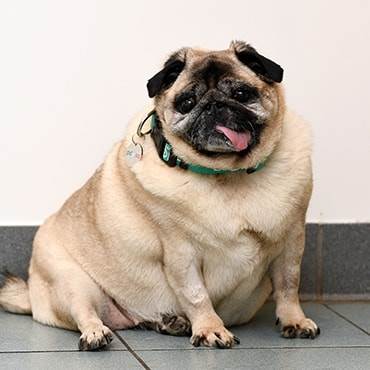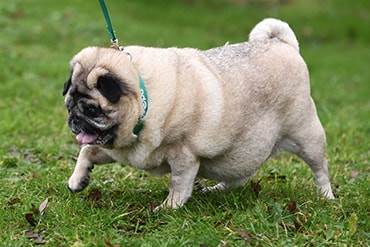Vet charity wants to find and fix the UK's fattest pets
31 January 2019
PDSA tackling 'pet obesity epidemic' affecting the nation
Vet charity PDSA is appealing for the UK’s fattest pets to enrol in a national pet slimming competition. The call comes as stats reveal up to half of UK pets (46% of dogs, 34% of cats and 30% of rabbits)* are believed to be overweight or obese.
The charity’s vets are warning owners that overfeeding and not providing enough exercise is driving an obesity epidemic among our four legged friends, which is risking their long-term health and happiness.
To help tackle the problem, they are searching for the UK’s podgiest pets to take part in this year’s PDSA Pet Fit Club – the UK’s top pet slimming competition.
Now in its 14th year, the contest has helped 137 overweight pets (85 dogs, 42 cats, 8 rabbits and 2 rats) lose an incredible 75 stone - equivalent to 1,190 cans of dog food! The competition’s 2018 joint winners, Sadie the Labrador from Basildon and Borris the Spaniel from Kent, shed a total of 2st 12lb (17.8kg) between them – 25% of their bodyweights.
Owners can enter their pets in Pet Fit Club at pdsa.org.uk/petfitclub.
PDSA vet Olivia Anderson-Nathan said: “Obesity has been a huge problem among UK pets for a number of years and sadly there is no sign of improvement. It is one of the biggest long-term health concerns for our pet population, because it is so commonly seen by vets and nurses.
“Animals who are overweight have a much greater risk of developing health problems such as arthritis and diabetes – which can have drastic consequences.
“Excess weight can also seriously aggravate other medical problems, for example making it even more difficult for flat-faced breeds like Pugs and French Bulldogs to breathe. Research has also shown that carrying too much weight can even reduce a dog’s life expectancy by up to 2 years and 6 months**.”
Pet Obesity: The Facts***
- Vets and vet nurses estimate that up to half of UK pets (46% of dogs, 34% of cats and 30% of rabbits)* that they see in their practice every week are overweight or obese.*
- 4 million (2.4 million dogs, 1.5 million cats and 30,000 rabbits) are fed table scraps or leftovers as one of their main types of food.****
- 80% owners stated their dog was an ideal weight, but 40% didn’t know their actual weight or body condition score.
- 74% owners stated their cat was an ideal weight, but 65% didn’t know their actual weight or body condition score.
- 83% owners stated their rabbit was an ideal weight, but 77% didn’t know their actual weight or body condition score.
- Vet professionals estimated that 47% of overweight and obese dogs seen have health issues which could be related to weight*
- 34% of vet professionals felt the number of overweight or obese cats they see in their practise has increased over the last two years.*
- Inappropriate diet is the most common rabbit health concern amongst veterinary professionals
Treats
- 5 million UK pets (3.3 million dogs, 2.1 million cats and 140,000 rabbits) are fed treats (including crisps, cake, cheese, chips, takeaways and chocolate) every day.
- 41% cat owners feed treats because they believe food makes them happy.
12% rabbit owners feed treats because they feel guilty about leaving them alone
Exercise
- 89,000 dogs are never
- In a 24 hour period, on average rabbits spend 12 hours in their hutch.
- 4% of cats (440,000) have no opportunities to exercise every day****
“It’s well known that we are a nation of animal lovers,” continues Olivia, “but unfortunately a lot of pet owners are showing this love and affection using food. But this way of ‘treating’ your best friend can be bad for their health in the long run.
“Pets don’t need human food, in fact a lot of it can be very bad for them. They should be fed a complete pet food suitable for their age and weight, with occasional healthy treats. Our pets also need regular, varied exercise, suitable for their health and to keep their minds stimulated.
“A much healthier way to spoil a pet is to spend time with them, like taking them for an extra walk, buying them a new toy or giving them more playtime.”
About PDSA Pet Fit Club
Up to 15 overweight pets (dogs, cats, rabbits and rats) from across the UK will be chosen to participate in PDSA Pet Fit Club.
Previous ‘losers’ include Alfie the dog who lost a record 39% of his bodyweight – he had piled on the pounds after tucking into Sunday roasts with his owner. Pet Fit Club also helped Zorro the cat, who enjoyed eating cheese and onion crisps, lose a fifth of his bodyweight.
Selected pets are placed on a strict six-month diet and exercise programme, individually tailored to their needs and overseen by vets and vet nurses at their local PDSA Pet Hospital.
Participants receive free diet pet food for the duration of the competition courtesy of Dechra Specific. The overall Pet Fit Club Champ, crowned at the end of 2019, will win a year’s free diet food and a pet friendly holiday.
Olivia concludes: “Over the years PDSA Pet Fit Club has helped transform some of the UK’s fattest pets into fit and healthy animals. Pets that could barely walk, climb stairs or fit through cat flaps have been given a new lease of life.
“Prevention is always better than cure, but it is never too late to make a change. With the right advice, a good diet, suitable exercise and a bit of willpower owners have the ability to make a real difference to their pet’s lives. So we’re urging owners who have overweight pets to enter today.”
Case study (more available on request)
Sugar, from Caerphilly, South Wales
A podgy Pug from Caerphilly, Wales, who weighs the same as a toddler is going on a diet. *****
Sugar may be sweet but her huge size is having a big impact on her life.
The 12-year-old pooch was rescued eight months ago by her current owner Steve Jones, when she was already massively overweight. She has managed to shed some pounds but still tips the scales at a whopping 1st 12lb (11.9kg) – around double the size she should be.
Steve (62) says Sugar had piled on weight as she didn’t receive any exercise with her previous owner.
He said: “Sugar’s owner was partially sighted and her limited vision meant she couldn’t cope with her. She never used to go out for walks at all.”
Stephen continued: “She has poor vision herself, and is also deaf, which presents quite a few challenges. In the last couple of weeks she’s also had to have all her teeth taken out so she’s not enjoyed the best of health recently.”
Sugar suffers from a host of health problems, many of which are related to her age, breed or lack of exercise, and could have been made worse by her weight. For example, giving her an anaesthetic for recent dental work was much higher risk because of her size.
Steve says that since adopting Sugar they’ve helped her lose around a kilogram, and have sought help from vet staff at Cardiff PDSA Pet Hospital in battling the bulge.
He said their other dog Winston, a Bichon Frise, is healthy weight and has up to four walks a day.
“I take Sugar out as well but we have to go at her pace and it takes a lot longer so she is walked once a day at the moment,” said Steve.
“Since she’s had her bad teeth removed she seems healthier and happier, so we’re going to try and increase her exercise.”
*British Veterinary Association (BVA) and British Veterinary Nurse Association (BVNA) Voice of the Profession Surveys (included in the PDSA Animal Wellbeing (PAW) Report 2018) showed that on average vets and vet nurses estimated that 46% of dogs, 34% of cats and 30% of rabbits that they see in their practice every week are overweight or obese. www.pdsa.org.uk
** Salt C et al (2018) Association between life span and body condition in neutered client-owned dogs. Journal of Veterinary Internal Medicine 2018; 1-11.
*** All figures, unless otherwise stated, are from YouGov Plc. Total sample size for the pet owners’ survey was 4,639 dog, cat and rabbit owners aged 18+ who live in the UK. Fieldwork was undertaken between 9 and 19 January, 2018. The survey was carried out online. The figures have been weighted and are representative of the population by pet species (cat, dog or rabbit owners) and the owner’s gender, age and region.
Extrapolations to pet population figures are based on the following estimates of pet populations in the UK: 11.1 million cats, 8.9 million dogs and 1.0 million rabbits.
**** From the PDSA Animal Wellbeing (PAW) Report 2016
*****Based on the average weight of a 2 year old child: https://www.emmasdiary.co.uk/toddler/child-health/size-matters


Weigh Up
Like people, pets need to eat the right diet and get plenty of exercise to live long, healthy and happy lives. But as many of us know, doing those things isn't always easy.
Read our advice